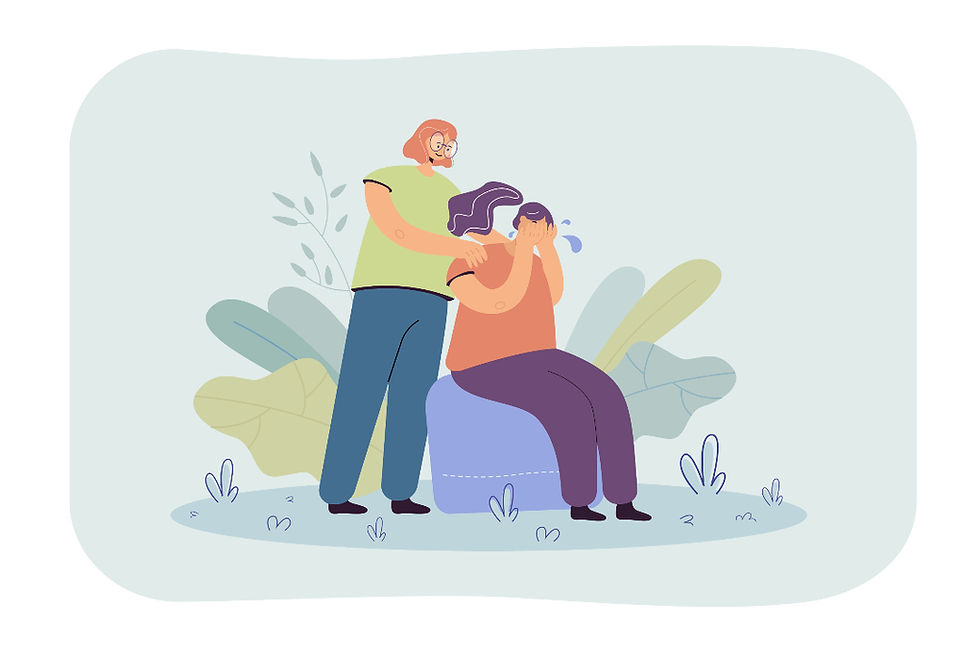Depression and Caregiving: When Helping Others Leaves You Empty
- hr8746
- Sep 9
- 4 min read

Caregiving is often described as one of the most meaningful roles a person can take on. Whether caring for an aging parent, a child with special needs, or a loved one living with illness, caregiving is an act of compassion and love. But behind the noble work lies a harsh reality: caregiving can be emotionally and physically draining, and when that exhaustion lingers, it often develops into depression.
At Caritas Behavioral Health Services in Columbia, MD, we work with many caregivers who come to us feeling guilty for struggling, as though their pain is less important than the person they care for. In truth, depression among caregivers is common—and treatable.
This blog explores the emotional weight of caregiving, how it contributes to depression, and what can be done to restore balance.
On this page:
The Emotional Burden of Caregiving
Caregivers face unique challenges that extend beyond the practical tasks of care:
Constant Responsibility – Always being “on call” leaves little space for rest or recovery.
Role Confusion – Caregivers may feel torn between being a spouse, child, or sibling and being a caretaker
Isolation – Caregiving responsibilities often mean reduced time for friends, hobbies, or personal goals.
Financial Strain – Missed work or medical costs create added stress.
These pressures accumulate, and without support, they can lead to caregiver burnout and depression.
How Caregiving Contributes to Depression
1. Chronic Stress
Managing medications, appointments, and emergencies creates ongoing stress that overwhelms coping systems.
2. Emotional Exhaustion
Giving constant support without receiving emotional care in return leaves caregivers depleted.
3. Loss of Identity
Caregivers may feel their personal lives, careers, and interests are replaced entirely by caregiving duties.
4. Grief and Anticipatory Loss
Caring for a loved one with a progressive illness often brings grief long before loss occurs, intensifying depressive symptoms.
Recognizing Depression in Caregivers
It can be hard for caregivers to identify their own depression. Warning signs include:
Persistent sadness or hopelessness
Difficulty concentrating or making decisions
Loss of interest in once-enjoyed activities
Changes in appetite or sleep
Irritability or emotional numbness
Feelings of guilt for “not doing enough”
Thoughts of worthlessness or despair
The Cycle of Caregiving and Depression
Depression doesn’t just impact the caregiver—it affects the quality of care provided.
Depression drains energy and motivation.
Tasks feel heavier, leading to guilt.
Guilt deepens depression.
Caregiving feels even harder, creating burnout.
Breaking this cycle is essential for both caregiver and patient well-being.
Why Caregivers Often Don’t Seek Help
At Caritas Behavioral Health Services, we hear many reasons caregivers delay support:
“I don’t have time to see a doctor for myself.”
“My loved one’s needs are more important than mine.”
“I should be able to handle this—it’s my duty.”
“I feel guilty prioritizing my own mental health.”
The truth is that caring for yourself is part of caring for your loved one. A healthy caregiver provides better care.
Practical Strategies for Caregivers Facing Depression
1. Acknowledge Your Feelings
Recognize that exhaustion, sadness, and frustration are valid responses, not failures.
2. Build a Support Network
Rely on friends, family, or support groups for emotional relief.
3. Practice Micro-Self-Care
Even five minutes of breathing exercises, stretching, or journaling can create a reset.
4. Set Boundaries
Caregiving doesn’t mean saying yes to every demand. Learn when to delegate or ask for help.
5. Use Respite Care
Temporary caregiving relief services allow caregivers time to rest and recover.
6. Prioritize Sleep and Nutrition
Basic self-care fuels resilience and stabilizes mood.
When Professional Help Is Necessary
If sadness, guilt, or hopelessness persist beyond a few weeks, or if caregiving feels unbearable, professional help may be needed. Seeking therapy or psychiatric care is not selfish—it’s survival.
How Caritas Behavioral Health Services Supports Caregivers
At Caritas Behavioral Health Services – Columbia, MD, we provide compassionate care tailored to the unique challenges of caregivers:
Comprehensive evaluations to identify depression and related conditions
Therapy (CBT, trauma-informed, grief counseling) to process emotions
Medication management when needed to stabilize symptoms
Supportive counseling that emphasizes self-compassion and resilience
Telehealth options for flexible, accessible care
We remind caregivers: you cannot pour from an empty cup. Supporting your own health ensures you can continue to care for others with love and strength.
Conclusion
Caregiving is an act of deep love, but it can also be overwhelming. Depression among caregivers is common, yet often hidden under guilt or self-neglect. Recognizing the signs and seeking support is not abandoning your loved one—it’s honoring both of you
At Caritas Behavioral Health Services in Columbia, MD, we help caregivers navigate depression with compassion, evidence-based treatment, and holistic support.
Because caring for yourself is the first step to providing lasting, meaningful care for others.
References
American Psychological Association (APA). Depression and Caregiving.
National Institute of Mental Health (NIMH). Signs of Depression.
Family Caregiver Alliance. Caregiver Health and Depression.
Mayo Clinic. Caregiver Stress and Burnout.
Caritas Behavioral Health Services LLC is Ready to Help
At Caritas Behavioral Health Services LLC, we're all about supporting you in recognizing when it's time to seek out a pro. You've got this, and we've got you.
.webp)


